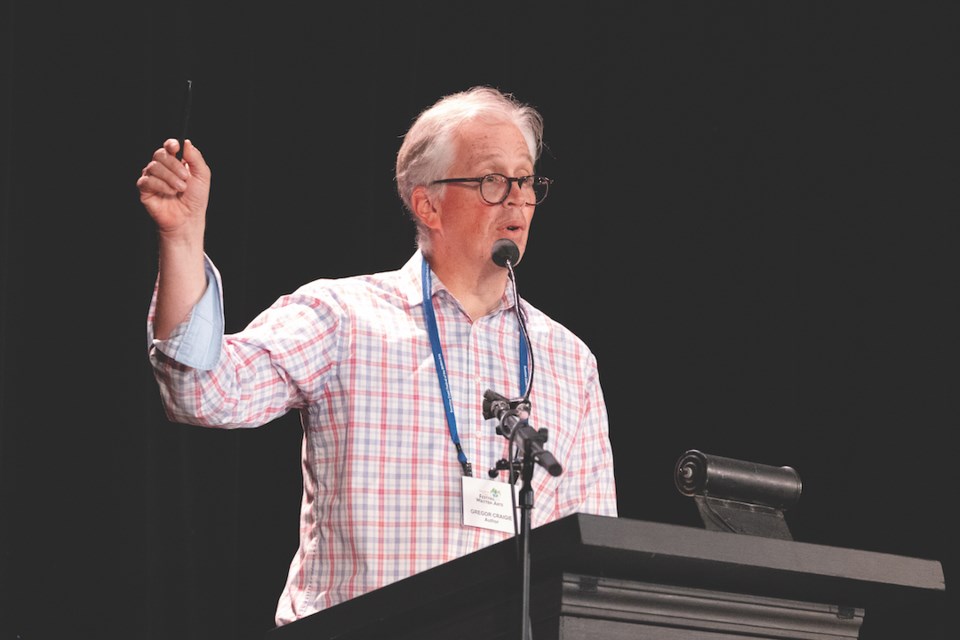The sobering centrepiece of the 42nd Sunshine Coast Festival of the Written Arts — the annual Rockwood Lecture — reflected a theme common to many of the festival’s two dozen guest presenters: in a world wrenched by crises, carefully-carved words offer salve and solutions.
CBC Victoria radio host Gregor Craigie presented the hour-long lecture to a capacity audience in Sechelt’s Rockwood Pavilion. “I guess as a journalist, I’m somewhat used to being the bearer of bad news,” he said. He summarized evidence and arguments from his latest book: Our Crumbling Foundation: How We Solve Canada’s Housing Crisis.
While preparing an earlier fictional story (published last year as the novel Radio Jet Lag) Craigie recognized the severity of homelessness in Victoria and beyond. A 2015 encampment on the lawn of the city’s provincial courthouse made headlines around British Columbia. “Its inhabitants quickly took on a key role in the story,” he said. “At first I was perplexed, but as I continued to write, I realized I couldn’t finish the novel without them. Homelessness has become a daily fact of life in Victoria as it has in so many other Canadian cities.”
The cost of homes has skyrocketed since the turn of the century, he said. From 2001 to 2021, the average cost of a house in Canada increased 365%. In the same period, other day-to-day costs rose by 43%.
Meanwhile, there is a dramatic lack of supply. “Put simply,” he said, “Canada does not have enough homes.” He cited figures from the Canada Mortgage and Housing Corporation suggesting that by 2030 the country will need an extra 3.5 million residences.
Part of the cause, Craigie said, is a lack of policies that link annual immigration quotas to housing starts. He emphasized that he was not pointing fingers at new arrivals to the country. Instead, he blamed careless planning by multiple levels of government. While researching the book, he was “astounded” to learn that there is no formal process to promote new housing supply at the same pace as increasing numbers of new residents, temporary foreign workers and international students.
Government red tape — particularly at the municipal level — also delays new and innovative housing developments.
In the absence of simple fixes, Craigie said, other countries offer examples that could work in Canada. In the United Kingdom’s key worker housing scheme, people working in essential roles (nurses, police officers, care aides) can obtain government assistance to find a home. Housing co-ops in Canada provide accommodation for just 250,000 people, while in Germany the affordable, long-established approach is used by five million residents.
Over a span of just three years, the Île-de-France region — centred on Paris — doubled its housing construction by taking a holistic approach to municipal planning: designating public land for construction while establishing business hubs and metro stations. Public housing was prioritized. Financial incentives and quotas drove developers to prioritize construction of affordable units.
“I know this is difficult,” Craigie said. “I live on a block [in Victoria’s Oak Bay] where people don’t want to do this. Many aspects of the French example could be adapted in Canada. But just as every person is unique, every country has its own set of challenges.”
Craigie was introduced by Kim Darwin, president of the Sunshine Coast Affordable Housing Society. After five years of partnership with the Town of Gibsons, the society’s Shaw Road project recently finished construction of 73 new rental units in Gibsons. The first of 40 families will move in on Sept. 1.
“Real change is possible,” said Craigie. “I hope you won’t look away. We all need to pay attention to this crisis.”
The festival featured authors from across Canada (novelist Charlene Carr, author of We Rip the World Apart, traveled from Nova Scotia) and local to the West Coast.
Sunshine Coast writers included Naomi Klein (who ruminates on the distorting influence of misinformation in her new book Doppelganger), best-selling memoirist Marion McKinnon Crook, Order of Canada member David Roche, and Kara Stanley. Stanley presented her new book, The Pain Project, accompanied by her husband, musician Simon Paradis. Paradis used music to mitigate pain and enhance neuroplasticity after a life-altering workplace accident.
Comedians Brent Butt and Deborah Kimmett provided visceral insights into the preparation of their latest releases. Bowen Island resident and acclaimed anthropologist Wade Davis concluded the festival with an oratorical barn burner, mounting a defense of his academic discipline and a full-throated celebration of independent thinking.



